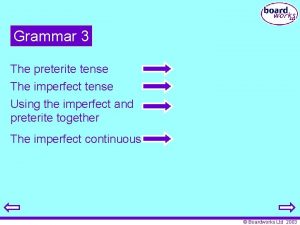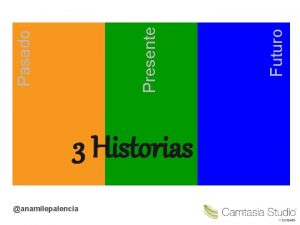EL PASADO PERFECTO La Historia de Toledo El








- Slides: 8

EL PASADO PERFECTO La Historia de Toledo

El Pasado Perfecto The past perfect is used to talk about what “had happened. ” Habíamos Habíais Habían + Participio Pasado Ana habia comprado las entradas para el concienrto. Cuando llegamos a la fiesta, Antonio ya había salido.

Usos del Pasado Perfecto • Used to express what “had happened. ” • Often used with “ya” or “todavía no. ” • Commonly used in sentences with the preterite to show sequence of actions in the past. • Past participles do not agree in number and gender and th verb haber is in the imperfect tense.

Pasado Perfecto cont… Los Moros ya habían construido las murallas cuando la Reconquista terminó.

Pasado Perfecto Cont. Cuando los visigodos llegaron a Toledo, los romaos ya habían establecido una colonía allí.

Pasado Perfecto Cont. Ana todavía no había comprado el plano de la ciudad cuando la visita guida de Toledo empezó.

Pasado perfecto… Choose between the past perfect and the preterite for each spa 1. Yo todavia no ____ (encontrar) mi asiento numerado cuando el tren ______ (salir) 2. Cuando yo ___ (llegar) a la clase, la maestra ya___ (empez a enseñar la clase. 3. Cuando Abe Lincoln ______ (dar) la Gettysburg Address, los esclavos todavia no ______ (recibir) la libertad. 4. Ya ______ (nevar) doce pulgadas cuando nosotros ___ (sa para Pittsburgh.

Traduce 1. When the train arrived, we had already sat down in our numbered seats. 2. The Visigoths had already conquered the romans when the Moors took control of Toledo. 3. The Reconquista of Spain had already ended when the Inquisition began.














